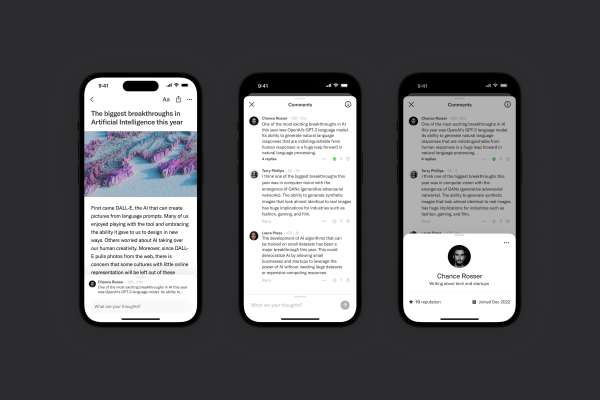Artifact, the recently launched personalized news app from Instagram’s founders, is today launching a key new feature: a social discussions component. Previously in private testing, the feature introduces a way for users to comment and engage in conversations around news articles they’re reading on the service. With today’s update, all Artifact users will now see comments on articles, the company says.
To leave a comment of your own, Artifact users will have to first create a profile on the service — a relatively simple process that requires you to add and verify your phone number. This initial step will help mitigate spam, the company notes.
These display names are not unique, which means no one has to fight over their name as they did on Instagram. While Artifact will encourage people to use their full names, it will allow pseudonyms.
The feature’s addition makes Artifact more of a social network around news, rather than just the personalized news reading experience it offered at launch. It also makes Artifact more competitive with other places where people share news and information, including larger platforms like Facebook, Instagram and even Twitter. Already, Artifact had offered a way to see which articles were popular in your own personal network, though without identifying the users who were reading them, as Twitter does through its Twitter Blue subscription feature “Top Articles.”
Of course, entering into more of a social networking space raises a number of potential pitfalls for any company, as it could invite bad actors who engage in harassment, abuse or spam, among other things.
Artifact says it will address moderation in a couple of ways. For starters, it will give each new profile a “reputation score” that’s based on community upvotes and downvotes on users’ comments. This is similar to Reddit’s voting mechanism, or even Twitter’s Community Notes fact-checking feature, but with the addition of an actual, visible score that’s displayed to all users.
The app will show a user’s reputation score — a numerical figure — next to every commenter’s display name and on each community member’s profile, the company explains. What’s more, this score will also play a role in determining how comments are ranked. That is, Artifact will use an algorithm that weights the user’s reputation, the score of the particular comment and a variety of other signals.
In addition, Artifact says it will use AI models to detect problematic content. This flagged content will then be reviewed for compliance with Artifact’s community guidelines and Terms of Service. If it doesn’t meet those guidelines, it will be removed. The company said it will also ban profiles “if necessary” — that is, in the most extreme violations of its policies.
Over time, this experience may evolve as Artifact learns more about what’s most effective.
“We’re starting off simple here and will learn based on our experience in the first few weeks what works best,” notes Artifact co-founder Kevin Systrom, in an email. “My belief is that one of the most interesting things to do around news and written content is to discuss it with others – this feature is the first step in a direction that will make Artifact more social and bring life to a community around news.”
Artifact launched in January as something akin to a “TikTok for news,” or rather a U.S.-based alternative to other personalized news aggregators like ByteDance’s Toutiao in China or Japan’s SmartNews. The app combines a variety of trusted sources into one interface, where your engagement and reading behaviors inform recommendation algorithms that help you discover the news you’re most interested in. However, unlike social media experiences, users won’t necessarily become stuck in “filter bubbles” because the app offers a grouping of headlines from disparate sources across any topic as you dive in to read. Plus, you can browse the top stories in the app outside of your “For You” page recommendations through its news verticals.
For the time being, the app is free to use during early-stage development. It may eventually choose to monetize through revenue shares with publishers, though nothing yet has been decided. Since becoming broadly available to the public in late February, Artifact has seen nearly 200,000 installs, according to data from app intelligence firm data.ai.
Artifact is available across most English-speaking App Stores and on Android.
